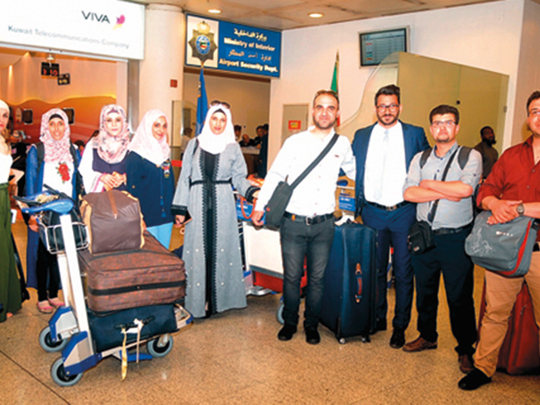
Manama: The first Palestinian teachers to arrive in Kuwait following a hiatus of 26 years said they were looking forward to “renewing the educational achievements accomplished by their predecessors who taught generations of Kuwaitis.”
“The contract with the Kuwaiti ministry of education is a great opportunity for us because of the increasing levels of unemployment in our country,” Diya Abdul Qadir, a physics teacher, said.
“We are so keen on the reinstatement of Palestinian teachers in Kuwait, especially since our Palestinian predecessors have left an outstanding impression on this land. We will again boost the reputation of Palestinian teachers as we endeavour to help lift the level of education in Kuwait to new heights,” Diya who left Palestine for the first time in her life, told Kuwaiti daily Al Qabas.
Osama Al Awiwi, a chemistry teacher, said the new Palestinian teachers were aware of the significance of their “noble mission.”
“We have come a long way from our homes, more than 1,800 kilometres away, to Kuwait in order to prove to the world that the Palestinian teachers are an integral part of the Arab and Muslim people and we will prove our aptitudes and capabilities and do our best to enhance the skills of the students,” he said.
Aslam Razaqat, a Maths teacher, said that he and his colleagues were keen on restoring ties between Palestine and Kuwait in the education field.
“Palestinian teachers are serious and competent and we will be as committed to the highest standards of education in Kuwait as we were in Palestine,” he said.
The recruitment was the first after Kuwait last year lifted its ban on hiring Palestinian teachers.
Palestinian teachers achieved an enviable reputation in Kuwait after they made remarkable contributions to the development of education in the country, mainly in the 1960s during the early days of the nation-building process.
However, their status plummeted in 1990 in the wake of a deep Kuwaiti-Palestinian rift following the invasion of Kuwait by Iraqi leader Saddam Hussain, which was supported by Palestinian leaders.
Kuwaitis felt betrayed by the pro-Saddam attitude of the Palestinians and following its liberation in February 1991, the government cut off ties with the Palestine Liberation Organisation (PLO), froze its financial backing and expelled a large number of Palestinians from the country.
Bilateral relations started to improve in December 2004 when Palestinian President Mahmoud Abbas apologised for the Palestinian position on Iraqi invasion of Kuwait.
Relations have since evolved and Kuwait repeatedly announced multimillion dollar donations for development projects in Palestine.
In April 2016, Kuwait’s education ministry said that it would be recruiting hundreds of Palestinians to teach mathematics and science in its schools. The teachers will be hired from Palestine or locally from the Palestinian community in Kuwait, it added.
However, as the education ministry announced its decision to end the hiatus, the interior ministry said that the Palestinian passport was not enough to grant them the residence permit that will allow them to stay and work in the country.
The legal hurdle was cleared one month later after the ministry said it would request Palestinians to present their passports as well as their travel documents when they apply for the residency permits.
“We need the travel documents because it allows us to deport the expatriate home in case he breaks the laws of Kuwait,” a ministry official said. “It is the guarantee that we need as a security department so that we do not face the issues we faced when dealing with Palestinians carrying Syrian, Jordanian or Egyptians documents, who were not accepted back on deportation by the countries that gave them the documents.”
With plans to hire 180 teachers in maths, physics, chemistry, biology and geology for the next academic year, a delegation from Kuwait’s education ministry in spring travelled to Palestine where it conducted tests and interviews to choose the successful applicants from a list of 1,173 teachers, including 425 women.
However, following the final selection, the ministry was able to recruit only 103 after the other 77 successful applicants said they would not agree to work for a monthly salary of 480 Kuwaiti dinars (Dh5,835), well below the KD800 they had expected to receive.












